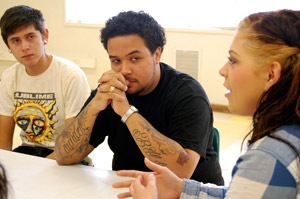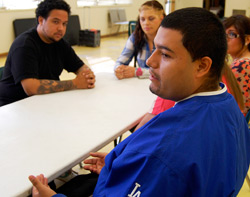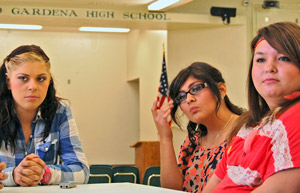Getting real about graduating

From left Brigitte Olguin, Abigael Perez-Rodriguez, Curtis Hess, Rosario Franco, Mayra Frias, Cindy Ávalos, Maycoll Arata.
l
A new program called the Diploma Project is trying to reduce dropout rates at Los Angeles Unified School District schools. The Diploma Project, which is funded by the federal government, has dropout prevention counselors in six middle schools and six high schools. The high school counselors find students who have dropped out and work with them to get them back in school. They can either re-enroll at their high school or in a program where they can make up their credits, like adult school, continuation school or independent study. We talked to students from Fremont and Gardena, two high schools that are part of the Diploma Project, about why they dropped out and what helped them return. They were all thankful for the Diploma Project for helping them get back on track to graduate.
Editor Mike Fricano: Why did you drop out?
Maycoll Arata, 20, Gardena Adult School graduate: I was too busy partying, clubbing, going out and having fun instead of studying and doing homework.
Cindy Ávalos, 18, Alternative Education Work Center (AEWC), an independent study program on the Gardena High campus: When I was in ninth grade I didn’t know it was that important to graduate. I didn’t go to class, I didn’t pay attention at all. In 11th grade I realized it was important and I noticed I wasn’t going to be able to graduate.
Mayra Frias, 19, Gardena HS: For me it was a personal problem … Me and my mom would fight every day. That’s when I decided to drop out, which I did when I was in 11th grade for two months. I started looking for a job and I never found one. Then I decided to come back.
Rosario Franco, 18, Gardena AEWC: Since ninth grade I started ditching and I guess it becomes a habit … Every year I would be like, “I’m going to do better next year” but then the next year I’ll go some days but then I’ll miss school other days and I’ll be like “When I miss out, it’s better.” So I started falling back. My senior year I went for three weeks. I was like, “I’m behind credits, I know I’m not going to graduate. Why go and waste my time?”
 Curtis Hess, 19, Gardena Adult School: I dropped out of school because I was kicking it with the wrong crowd, gang bangers.
Curtis Hess, 19, Gardena Adult School: I dropped out of school because I was kicking it with the wrong crowd, gang bangers.
Abigael Perez-Rodriguez, 18, Gardena AEWC: When I entered ninth grade I started hanging out with the wrong people. I was getting high, drunk. I started ditching more and more. We used to hop on Metro and go to downtown, Hollywood, do whatever we want, drink a couple 40s, have fun. I stopped going to school my senior year.
Brigitte Olguin, 16, Fremont HS: In ninth grade my dad was sick. He was almost dying so all that depression got to me and I missed school. I went with friends to try to feel better. It stopped at 11th [grade] because I got caught. They told me, “Why are you missing school? You have a future to go to.” I don’t want to be a low-life. I want to have a good car, a home. If I do good in school I’ll be the first one to graduate in my family. That motivates me to go to school.
Cynthia Garcia, 16, Fremont HS: I had family issues and then from there I started hanging out with the wrong crowd. I started ditching school. I was doing drugs. It started in eighth grade and it went until 11th.
Mike: How were you able to get away with this for so long? Where were your parents or teachers or truant officer?
Cynthia: Both my parents worked. So they thought I was in school when I really wasn’t.
Mike: But what about if you came home with a bad report card?
Cynthia: I would get the report card. They would ask, “When are the report cards due?” I was like, “I don’t know, probably they have the wrong address.” At that time my dad was an alcoholic so he never really paid attention. My mom was too busy trying to make money to put food on the table for us.
Cindy: I would get home first to get my report card, hide it, throw it away.
Abigael: In ninth grade my grades started being Fs. She [My mom] would be like “What’s going on?” But after a while she got tired.
Mike: Did you have parents who emphasized education?
Abigael: My parents came from a foreign country so they’re always telling me to look for a better opportunity that we have here in the United States but I didn’t listen to them.
Mike: When you were at your lowest point—ditching and done with school—what did you think your futures would be?
 Cynthia: My older brother would tell me, “I don’t want to see you like me.” I’d listen but then I’d get a little image of me, like what if in the future I’m going to be a pothead? That would get me down and I would keep doing more drugs.
Cynthia: My older brother would tell me, “I don’t want to see you like me.” I’d listen but then I’d get a little image of me, like what if in the future I’m going to be a pothead? That would get me down and I would keep doing more drugs.
Brigitte: I would put in my head, “I’ll just go to adult school or continuation later on and I’ll make it through.” So I didn’t worry.
Abigael: I just got lazy.
Rosario: I have always worked with my cousin. She works in the swap meet. They pay you cash so I’ve always had money. I was like, “I could work more days.” I really didn’t focus on school. But now you think about it, you can’t do nothing without a high school diploma. The swap meet is hard, after a while you get tired of it. It’s a job that’s not going to take you nowhere. So I’m like, “I have to go back.”
Maycoll: I used to think life was easy. You just get a job anywhere and you live off that. But now that I’m in the real world and I have a kid to support, I have my wife to support, now that I have a family it’s so hard. You can’t even get the low-paying jobs without a high school diploma. That got me to go back to school.
Mike: What motivated you to make school a priority?
Cynthia: My brother was telling me, “Go back to school because it’s not easy without a high school diploma. I mean, look at me. I can’t even get a job and you’re going to struggle a lot so take life more seriously.” And then he’s like, “Look at our little sister and our little brother, they look up to us. You don’t want them to be like us.” So I said, “Yeah, I need to take this more seriously.”
Abigael: I turned 18 and basically you’ve gotta grow up. It took me a while but I managed to come back to school.
Rosario: I have a younger sister, we’re one year apart. She was doing everything I was doing. I would tell her, “You finish school, stop ditching.” She was like, “How can you motivate me if you dropped out?” I started thinking, “I can’t tell her to do something that I couldn’t even do myself.” My teachers also, Ms. Robinson [in attendance] and Ms. Carmi [a Gardena Diploma Project counselor], they would call me every day. [They’d say,] “You have to go back to school, what are you going to do with yourself?” And then my older sister, she graduated and she goes to UC Riverside. She was like, “It’s not that hard … You have the brains to do it.”
Mayra: I have always pictured myself being a nurse, working with kids with cancer. When I used to hear friends say, I’m a senior already, I’m going to be this, I’m going to graduate, that’s what persuaded me because I didn’t want to stay behind.
Cindy: I’m an only child so I would want my mom to be proud of me. I would want her to be out in the crowd and see me graduate.
Mike: How did you get hooked up with the Diploma Project?
Rosario: When you drop out, they see how many credits you have and if you’re not that far behind they tell you, you still have the opportunity to get [a diploma]. Ms. Robinson was the one who would tell me, “Go to adult school and get the diploma.” Then Ms. Robinson introduced me to Ms. Carmi and she enrolled me.
Judi Carmi, a Diploma Project counselor at Gardena High: These are six of probably 250 students that I’m working with to try to locate and enroll in a credit recovery program. Once I get them re-enrolled, I check in with them often to make sure they’re staying on track. I invite them in if they’re in the area and I call them a lot.
Curtis: Often, often. Just to make sure … I stay on that track.
Mike: What are some of the things about the Diploma Project program that are making you have more success?
 Brigitte: Help from Mr. Jones [a Diploma Project counselor at Fremont High]. He was like, “You could go to a continuation school” and I didn’t know about that.
Brigitte: Help from Mr. Jones [a Diploma Project counselor at Fremont High]. He was like, “You could go to a continuation school” and I didn’t know about that.
Rosario: The program is independent study so they give you the work and you turn it in every week. I don’t have to go to school and I’m still getting my credits. [School] seemed boring, just dealing with the teachers for a whole hour, listening to them. Not all teachers teach you something. So you’d be like, “Why be in his class if all he’s doing is letting his students go wild?”
Mike: Why do you think independent study has been a good fit for you?
Cindy: Ms. Carmi calls me often. When she calls me I want to give her good news. So I’ll do my work. Every time I have some good news to give her.
Maycoll: I graduated last month. Everybody’s getting their stuff done. I used to see people getting into fights in the middle of class. It’s a different environment because people are actually serious about their education.
Mike: What do you think could be done differently to have prevented you from dropping out?
Curtis: Nothing could have stopped me from doing what I was doing.
Rosario: In the first month I only went four times. How do you let a student miss out for so long and then when they come back you just admit them like nothing? If you don’t have an excused absence, try to talk to their parents. Students would take it more serious.
Maycoll: Phone calls, voicemails, mail, none of that cuts it. You should get to the point with them like the second time. Start sending people to that person’s house until they finally see the parent, not just the student. Sit down with them and tell them what’s going on.
Mike: What are your goals for the future?
Cynthia: If I graduate, I want to be a social worker. I hope I will be able to help students with staying in school.
Brigitte: My goal is to graduate and work in the morgue.
Curtis: My goal is to be a tattoo artist someday. I’m good at drawing so it’s something to keep me busy, keep me out of trouble.
Rosario: I plan to finish high school and get a job and I guess go to college after.
Mayra: I plan to be a nurse at St. Jude and after that I plan to go to Mexico and work in this program that helps kids who have disorders.
Cindy: I want to get my high school diploma and I want to be a pediatrician.
Maycoll: Get a stable job and finally get to college.
Mike: If you could talk to your former self, what would you have told that dropout?
Cynthia: I would tell them it’s not worth dropping out because in the future you won’t have a good life. Stop ditching and get your life straight.
Mayra: My advice is to stay in school and to not hang out with the wrong crowd. Now I don’t care if I’m by myself. Don’t be with people who you know are going to end up making you or influence you to do what they do.
Cynthia: Don’t let nobody bring you down. If somebody tells you, “You’re not going to make it in high school or in life,” that’s not true. You just gotta put it in your head and think positive, yes I’m going to be able to do this.





1 Comment
[…] about our latest collaboration, which resulted in the cover story for our January-February issue: “Getting real about graduating,” a discussion with former dropouts who are back in school thanks to a new LAUSD program. We were […]